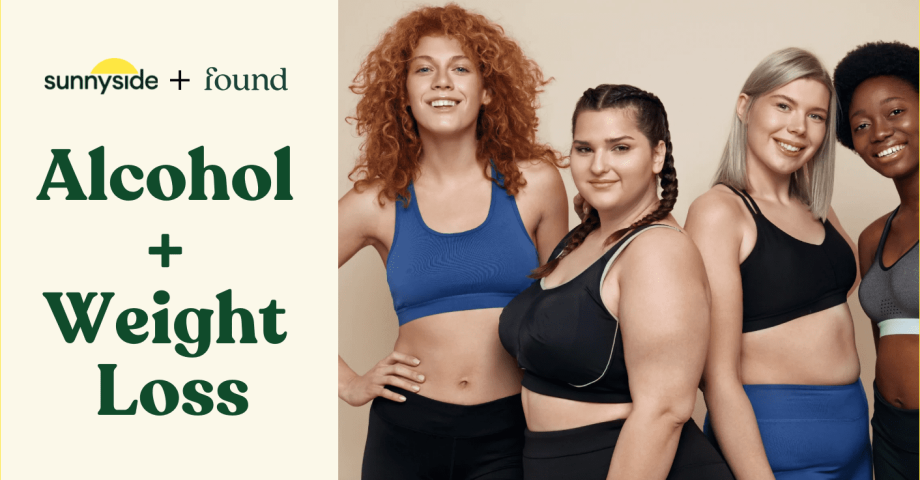Last Updated on May 17, 2023
This article is written in collaboration with our partner Found, an online weight care program that’s designed around your unique biology to make weight loss safe, effective and sustainable.They make weight loss and maintenance achievable by providing an individualized, medically-guided program, with prescription medication as appropriate, that leads to lasting results. As we talked with Found we uncovered several similarities in our approaches, the most important of which is deeply listening to members and helping them create a personalized path to success. Sunnyside members get a $50 discount on their Found membership using code SUNNYSIDE during checkout. Learn more about our partnership here.
America’s top three resolutions for 2023 are to exercise more, eat healthier, and lose weight. So, if your 2023 New Year’s resolution is to shed a few pounds, you share the same goal with around 40% of Americans.
But with the incoming barrage of parties and celebrations for the New Year (and soon the summer), there’s one concern that many people share; how does alcohol affect weight loss?
When your goal is to shed pounds or maintain a healthy weight, watching what you drink is just as important as watching what you eat. Fortunately, it is possible to lose weight and still drink beer, wine, and other alcoholic drinks.
The question is, “How?”
A proven solution is what’s known as mindful drinking. Sunnyside is a mindful drinking app that supports members in achieving their wellness goals, a common one being weight loss. In fact, Sunnyside members consistently report “Losing Weight” as the second most common reason for joining, behind “Improving Overall Health.”
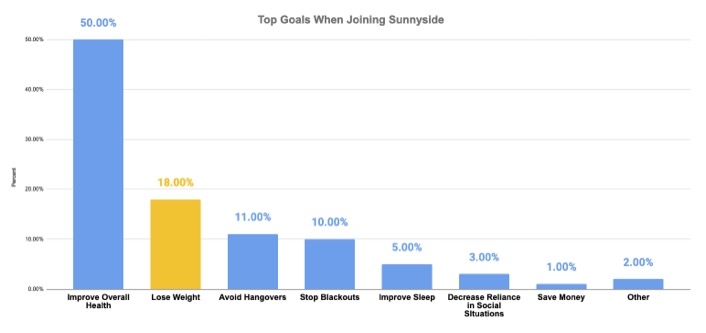
To date, tens of thousands of people have joined Sunnyside to lose weight through mindful drinking, and it’s often just the start of their weight loss journey. In their first 30 days, Sunnyside members avoid an average of 1,500 extra calories.
Alcohol can be a factor in weight gain, but this depends on your biology and drinking habits. So, in this article, we’ll explore the relationship between weight and alcohol. We’ll also look at how you can sustainably maintain a healthy weight without giving up alcohol entirely.
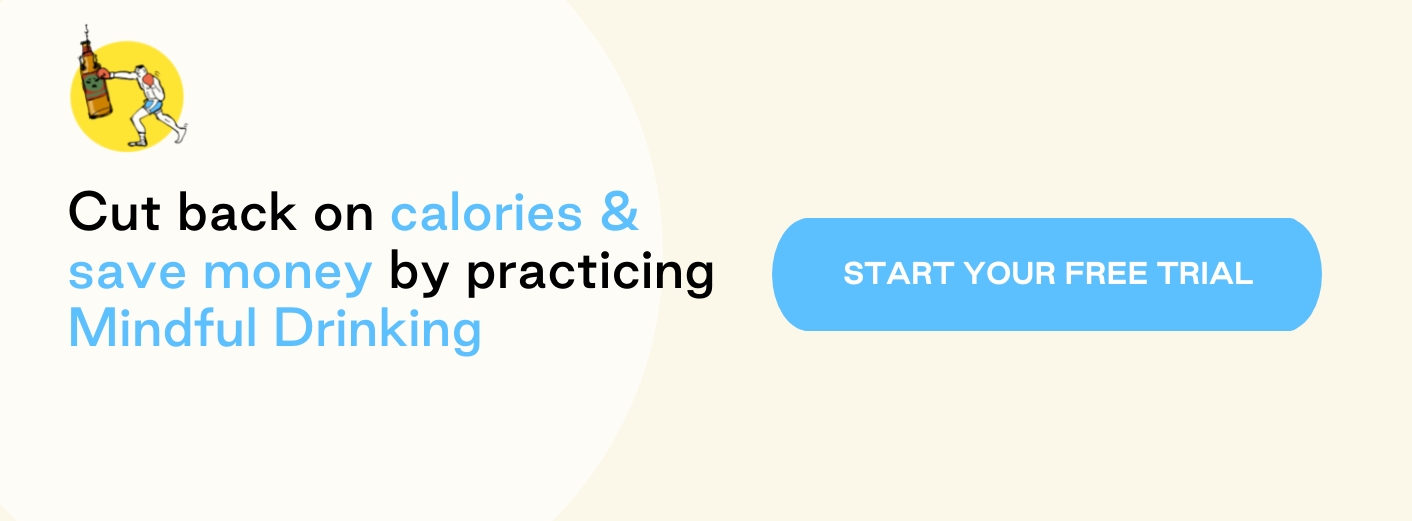
Part 1: How Alcohol Consumption Affects Weight Gain or Weight Loss
Studies have found that heavy drinking and binge drinking can be associated with weight gain and a greater risk of obesity.
On the other hand, moderate and light drinking is less likely to be linked to fat or weight gain. And surprisingly, some research has even found that light to moderate alcohol consumption was associated with less weight gain and a lower risk of becoming overweight and/or obese during 12.9 years of follow-up.
According to the Dietary Guidelines for Americans, moderate drinking is defined as two or fewer standard drinks per day for men and one or fewer standard drinks per day for women. Meanwhile, heavy drinking is defined as 15 or more drinks per week for men and 8 or more drinks per week for women.
Binge drinking is defined as drinking “a harmful amount of alcohol in one session of drinking.” What constitutes a harmful amount varies based on gender and the type and size of the drink.
Of course, alcohol isn’t the only factor that affects how much weight you gain or lose. But it is possible to gain weight from alcohol depending on how much, how often, and what you drink.
Let’s take a look at the reasons why alcohol may lead to weight gain:
1. Alcohol is a wellspring of empty calories.
Alcohol is notorious for delivering calories without nutritional benefits. These empty calories have no nutritional value, and excessive consumption could lead to weight gain.
Take, for example, a Piña colada. This popular summer cocktail may pack anywhere between 250 calories to over 400 calories. Meanwhile, a classic margarita contains around 200-300 calories per glass.
To put things into perspective, burning 250 calories is roughly equivalent to an hour of brisk walking and about 15-20 minutes of jumping rope. That being said, simply spending extra time at the gym doesn’t necessarily mean you’re undoing the effects of drinking.
According to Found,
“Your body needs high-grade fuel from food, as well as movement—even if it’s low intensity—to maintain a healthy weight and lifestyle. As often as you can, choose nutrient-rich foods, and try cooking more balanced meals at home.
Research has found that people who eat at home at least five times a week are more likely to lose weight, reach a normal BMI range, and have lower body fat than those who don’t. Continue incorporating regular movement, as well. Not because you need to run off that cake (or drink), but because you recognize the perks of being active and enjoy it.”
Of course, not all types of alcohol are calorie-laden. The caloric value of alcoholic beverages differs widely, so making wise drink choices might save you a decent amount of calories.
If you’d like to learn more about the estimated calories in different alcoholic beverages, check out this periodic table of booze we’ve put together.
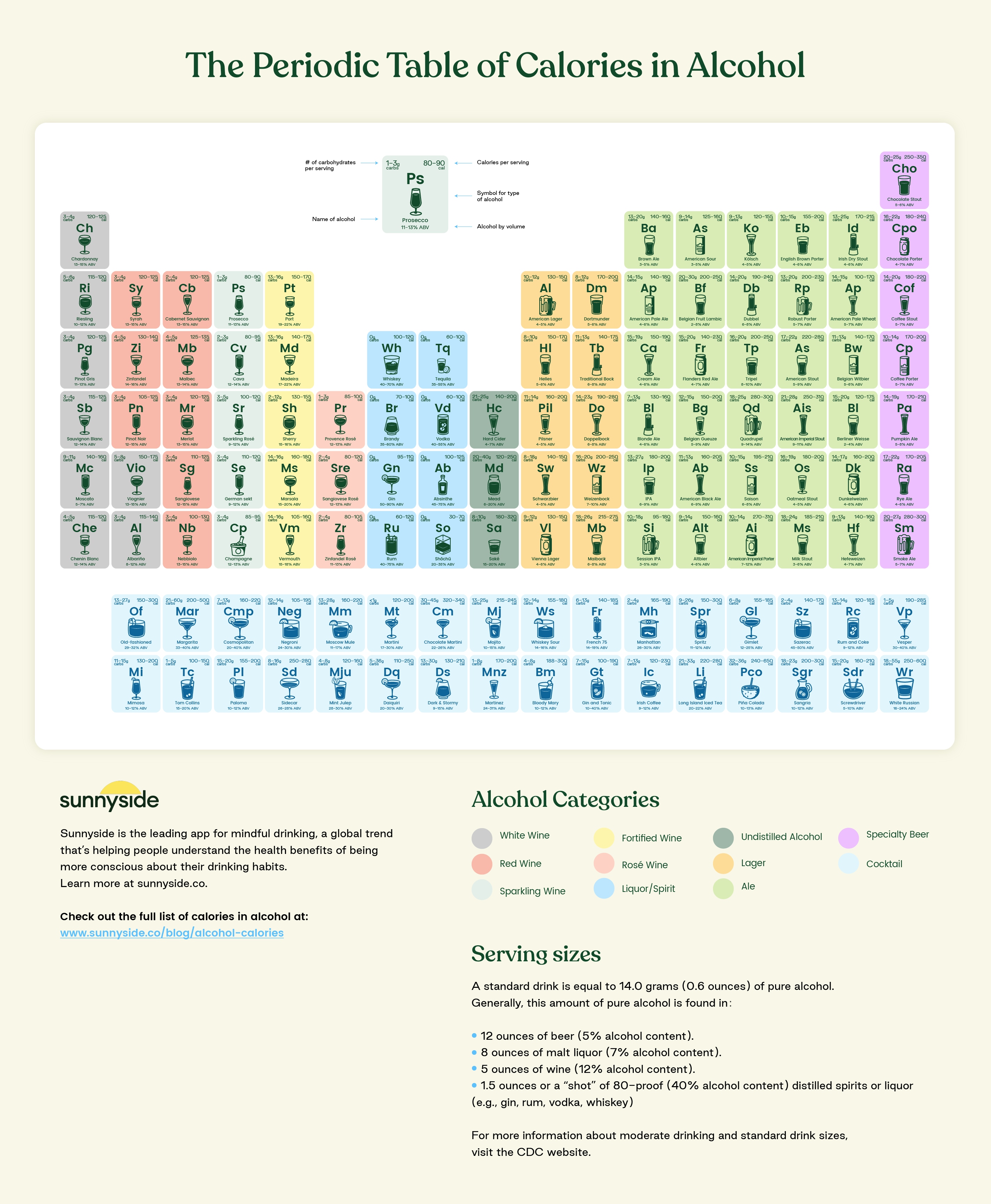
2. Alcohol impacts sleep quality.
While alcohol has sedative properties that help you fall asleep faster, these effects quickly wear off. And that’s when trouble brews.
Research has found that alcohol can momentarily increase sleepiness. However, people who drink alcohol before bed are more likely to wake up in the middle of the night or early in the morning. Researchers also express that consuming more alcohol before bed could lead to poorer sleep quality and shorter sleep duration.
Poor sleep can, in turn, increase your chances of gaining weight by impacting your metabolism and hormones. For instance, research shows that sleep loss can affect your body’s response to glucose, reduce insulin sensitivity, and increase the levels of cortisol (stress hormones) in the evening.
Additionally, lack of sleep may also increase the levels of ghrelin (known as the hunger hormone) and reduce leptin levels (which helps regulate appetite). Due to these changes, you may experience increased hunger or appetite, causing you to eat more.
In addition, according to the Sleep Foundation,
“Drinking in moderation is generally considered safe but every individual reacts differently to alcohol. As a result, alcohol’s impact on sleep largely depends on the individual…Drinking alcohol before bed can add to the suppression of REM sleep during the first two cycles. Since alcohol is a sedative, sleep onset is often shorter for drinkers and some fall into deep sleep rather quickly. As the night progresses, this can create an imbalance between slow-wave sleep and REM sleep, resulting in less of the latter and more of the former. This decreases overall sleep quality, which can result in shorter sleep duration and more sleep disruptions.”
Because sleep loss can change your hormone levels and metabolism, drinking alcohol before bed could be a risk factor for weight gain, especially if it leads to persistent sleeping problems.
How does poor sleep affect weight gain more specifically? The Sleep Foundation states that:
“…many studies have shown that sleep deprivation (whether due to self-induction, insomnia, untreated sleep apnea, or other sleep disorders) commonly leads to metabolic dysregulation. Poor sleep is associated with increased oxidative stress, glucose (blood sugar) intolerance (a precursor to diabetes), and insulin resistance. Extra time spent awake may increase the opportunities to eat, and sleeping less may disrupt circadian rhythms, leading to weight gain”
So not only can alcohol impact your quality of sleep, but poor sleep can certainly impact your body’s natural ability to regulate metabolism, and as a result, maintain a healthy weight.
3. Alcohol affects your appetite.
Some studies have shown that alcohol can enhance appetite and increase the pleasure of eating a meal.
Another study has shown that alcohol may even increase your cravings for high-fat, savory foods by 24% by enhancing the pleasure and sense of reward that comes with eating savory foods. Researchers believe this may be due to a learned effect because having savory foods in combination with alcohol is common in Western cultures.
And if you’ve had too much to drink, your judgment and decision-making may also be affected, leading to poorer food choices.
According to the National Institutes of Health, increased consumption of alcoholic beverages was associated with decreased quality of diet. Based on findings, alcohol intake increased caloric consumption and reduced the intake of fruits, vegetables, whole grains, and milk.
In other words, the more you drink, the more likely you are to make food choices that may not line up with your weight and dietary goals.
4. Alcohol changes how your body burns fat.
When you drink alcohol, your body prioritizes burning it ahead of all the other types of nutrients you consume.
Though more studies are needed to confirm these findings, some research suggests that alcohol may impact fat oxidation, leading to fat-sparing and higher body fat in the long run. In other words, alcohol may reduce how much lipids and carbs your body burns, and these excess nutrients could end up as adipose tissue or fat.
Interestingly, some research notes that the effects of alcohol on body weight and fat are more pronounced in men compared to women. In fact, a research review has shown that beer consumption in men could be associated with increased abdominal adiposity (nicknamed a beer belly).
However there’s even further evidence that “women who previously tolerated several drinks a week will report adverse effects related to sleep disturbance or mood disturbance often as early as the late 20s and early 30s. The complaint I hear from women in their 40s and 50s is that even small amounts of alcohol will lead to weight gain, and abstinence can lead to weight loss and better weight maintenance,” asserts Dr. Kumar, who shared these insights in an article from Found.
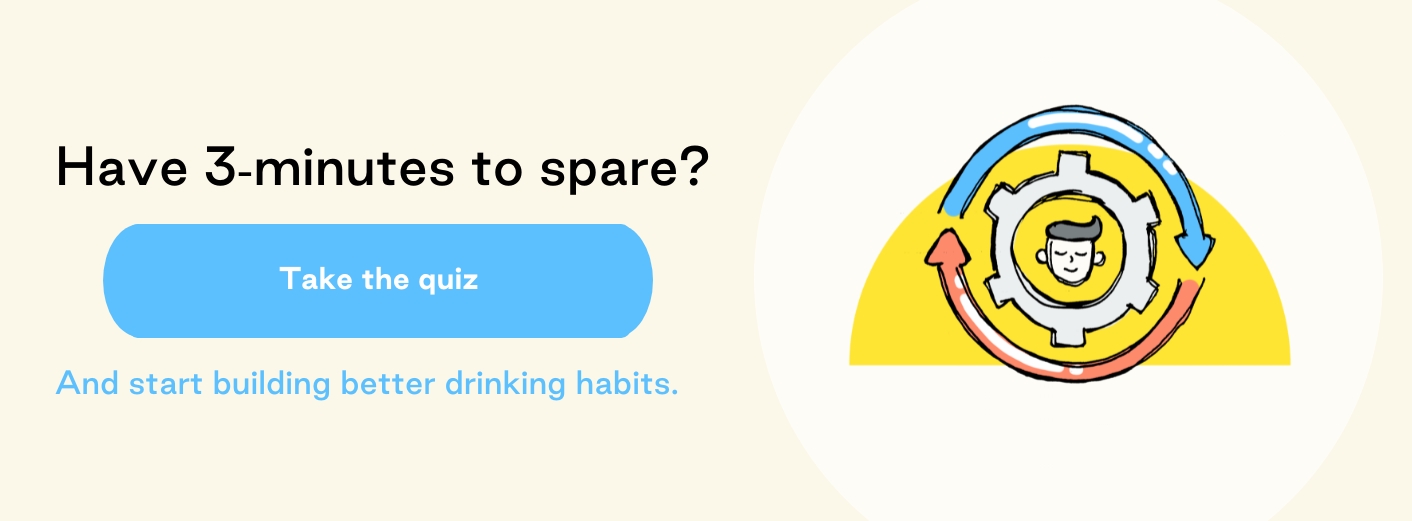
Part 2: Myths and Facts about Weight Loss
Our friends at Found are experts in personalized weight care and have deep knowledge around the myths and facts about weight loss. Here are a few of them:
Myth: Overeating is the main cause of obesity
Research shows that weight loss is more than just calories in versus calories out. For example, a study published in the American Journal of Clinical Nutrition found that for some people, obesity may be caused by a diet high in processed carbohydrates that impacts insulin levels and other biological processes and promotes fat storage—even without eating too many calories.
Myth: Cutting calories is the best way to lose weight
Eating less may help with weight care, but slashing calories too much can have the opposite effect. Our bodies have evolved to avoid starvation (when there weren’t tempting food options on every block). So when your body senses a continued lack of calories, it triggers a metabolic slowdown and other changes that can keep you from losing weight—and even prevent you from keeping the pounds you’ve lost off.
Myth: Exercise helps the pounds come off
Does getting regular exercise have many health benefits? Yes! And it can be an important part of an overall lifestyle plan (along with things like good nutrition, sleep and stress management) that gets you to your weight care goals. But there’s evidence that your body adapts to a certain level of calorie burn. So while a moderate amount might work, this is a case of more not necessarily being better.
Truth: Long-term weight loss might require medication
The newest class of prescription medications have been shown to be safe and effective for weight loss—and are considered a standard in weight care by obesity experts. That’s because lifestyle habits, while important, can only go so far. Because biology is known to play such a big role in weight care, medications can be the difference you need.
Part 3: Things You Can Do to Lose Weight Sustainably
Losing weight typically requires a holistic approach. Weight management isn’t just about eating and exercising; and depending on your biology, even if you have a healthy lifestyle you still may not get the success you want without medical care.
At the same time, making drastic lifestyle or dietary changes isn’t sustainable for most people.
Ultimately, it may take some trial and error to find what works for you—whether it’s making small but consistent changes to your eating habits or practicing mindful drinking. So, don’t forget to show yourself patience and kindness along the way!
These are tips on how to lose weight sustainably without giving up drinking.
1. Track your alcohol.
Drink tracking helps you keep tabs on how much you drink, empowering you to cultivate healthier drinking habits. By tracking your drinks, you can also estimate the calories you’ve consumed.
One of the most convenient ways to track your drinking is by using an app like Sunnyside. Sunnyside is a mindful drinking app that provides daily reminders and prompts to record the number and type of drinks you’ve had. You’ll also receive insights on how well you’re pacing through the week based on your personalized wellness goals.
2. Stay hydrated while drinking.
One of the best ways you ensure you don’t drink more than you’d like to is to stay well-hydrated (with water, of course!) during night outs and parties.
A useful rule of thumb is to alternate each alcoholic beverage with a glass of water, as this helps you pace your drinking throughout the session.
Because alcohol is a diuretic, it may also cause your body to become dehydrated more quickly. So, keeping yourself well-hydrated could help reduce the risk of post-drinking headaches and fatigue from dehydration.
3. Fill your tummy before drinking.
Filling up on food before you get to your party helps you pace your drinking better later on. A full and content stomach makes you less likely to quell your hunger with alcoholic beverages or unhealthy snacks at the bar.
Additionally, getting food into your stomach is said to slow the absorption of alcohol as you drink. This may prevent you from getting tipsy too quickly, so your judgment remains clearer through the night. That way, you’ll be able to make wiser drinking choices.
You may have heard that having high-fat foods before drinking is the best way to slow the absorption of alcohol into the bloodstream. This might be true, but any food, for that matter, could help to reduce the speed at which alcohol is absorbed.
If you’re looking to lose weight, high-fat foods aren’t the best choice. Instead, have a nutritious, well-balanced meal with a generous serving of fruits and vegetables before hitting the bar.
4. Opt for drinks with lower calories.
Some of the best alcoholic drink options for people focusing on weight loss contain just over 100 calories per serving.
For instance, a gin and tonic contains just over 100 calories. Compare this to a Piña colada, which may clock in over 200 calories and, sometimes, even go up to 400 calories per serving!
These extra calories can stack up during a night out. So, it’s a great idea to get familiar with the typical calorie content of your favorite tipples.
Other lower-calorie alcoholic beverages include white wine, light beers, and lower-ABV cocktails, such as the Screwdriver, Mimosa, and Paloma.
Check out this periodic table of booze that showcases the calories of over 100 different alcoholic beverages.
That said, it’s no fun obsessing over calories when you’re enjoying cocktails on a night out or having a celebratory bubbly at your office party. So, Sunnyside can help make the process simple and convenient by providing a personalized weekly action plan based on your weight loss and wellness goals.
5. Concoct your own low-calorie cocktails.
If you aren’t ready to give up your favorite cocktails due to their higher-calorie content, here’s another alternative; create your own lower-calorie recipes.
To do this, you could swap out one ingredient for another. For instance, replacing Coke with diet Coke could get you a Rum and Coke with about 30% fewer calories. Another example would be swapping out regular tonic water for diet tonic water in a gin and tonic.
Alternatively, you can also put together non-alcohol or lower-alcohol cocktails at home. Since alcohol contains empty calories, reducing the amount of alcohol in your cocktail lowers the total number of calories in your drink.
Part 4: Finding Balance and Staying Mindful
Mindful drinking can propel your weight loss journey forward. But as with any habit, mindful drinking is a practice that requires time, patience, and commitment to cultivate.
These are a few resources and tools that may help you stay on track with your weight loss and mindful drinking journey:
- Sunnyside: This mindful drinking app helps you kickstart your mindful drinking journey through drink-tracking tools, access to real-life coaches, daily motivation and tips, and weekly personalized action plans.
- The “Mindful Drinking, How Cutting Down Can Change Your Life” Book: If you’re keen on redefining your relationship with alcohol, this book is a good read. It combines scientific evidence and practical tips that help readers cultivate healthier drinking habits.
- The “This Naked Mind” Book: Yet another fantastic read for anyone who drinks—This Naked Mind dives deep into the psychological and neurological components of alcohol use and reveals the social and cultural factors that nudge us into unhealthy drinking patterns.
Part 5: FAQ
If I stop drinking alcohol, will I lose weight?
Drinking alcohol, especially in excess, will add extra calories to your diet. In general, you lose weight when you burn more calories than you consume.
Thus, cutting back or quitting alcohol, combined with other evidence-based weight loss methods, could help you lose excess weight, but it’s certainly not a guarantee. As we have mentioned above, a
holistic approach to losing weight is always best.
If I stop drinking alcohol, will I lose belly fat?
According to some research, heavy drinking increases the risk of accumulating excess fat in the abdominal region, especially in men. If you do drink in excess, cutting back or quitting alcohol may help you lose weight and belly fat.
Can I drink alcohol and still lose weight?
Yes, it is possible to drink and still lose weight. However, drinking mindfully is key to ensuring you don’t go overboard with your alcohol (and calorie) consumption. It also helps to track your drinking and opt for alcoholic beverages that have the least impact on your weight care goals.
What are the healthiest alcoholic drinks for people trying to lose weight?
Light beers and low-sugar, dry wines like Pinot Noir are some of the lowest-calorie and healthiest alcoholic beverages for weight loss. You could also opt for spirits, such as vodka, gin, or tequila, with low-calorie mixers like a diet soda or diet tonic.
Why does alcohol make me gain weight?
Alcohol delivers empty calories, which are calories that do not have any nutritional value or benefits. Apart from that, alcohol can also lead to poorer sleep quality, which in turn, can impact your metabolism and hormone levels.
For instance, some research has shown that a lack of quality sleep may reduce your body’s sensitivity to insulin, raise stress hormone levels, and increase the levels of ghrelin, also known as the hunger hormone. Furthermore, alcohol may heighten your cravings for high-fat, savory foods and lead to poorer food choices. Cumulatively, these effects of alcohol could contribute to weight gain.
If I stop drinking, will I gain weight?
Some people may gain weight after quitting alcohol. As mentioned earlier, alcohol isn’t the only determining factor for weight loss; other aspects of your biology and lifestyle, such as diet and exercise, as well as sleep and stress management also come into play. As an example, some people may notice increased sugar cravings after stopping alcohol, and this might encourage them to consume more sugary, higher-calorie foods. Essentially, this makes it more difficult for them to reduce their total caloric consumption, even without alcohol in the mix.
Power up your weight loss journey, and cut back on drinking with Found and Sunnyside
We’ve partnered with Found because they offer a science-backed approach to weight care that considers your unique biology, psychology and lifestyle. Fact: Members who receive medication in addition to help with behavior changes lose at least 13% more weight—and in some cases up to 229% more—than those receiving the same medication without the extra support. To start your journey, take the Found quiz.
And if you’re ready to reduce your alcohol intake, take Sunnyside’s 3-minute quiz and start cutting back on drinking.
